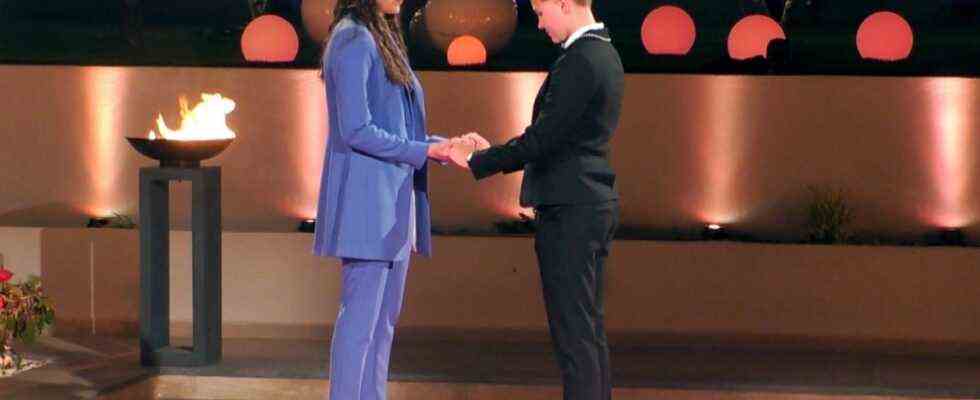Reality television has never been suspected of being particularly educational. Reality viewers like to bask in their superiority when watching trash TV, how can you learn something? Princess Charming, the lesbian dome show on TV Now, dares a big experiment. The format provides insights into a world that is rather unknown to many people – without malice, without making fun of yourself, without arrogance.
The concept is simple: As with Prince Charming, the original gay version of the show, fights a group of singles at its finest Bachelor-May around the heart of a seemingly unattainable beauty. Only there is no gelled underpants model, but Irina hose, 30, a lawyer. “I was afraid in advance that the show might get trashy because I didn’t know the cast and basically anything can happen on reality TV,” she told the SZ. She addressed this fear in the preliminary talks with production.
That in the end there is no format like that Summer house of the stars came out is not a matter of course. After all, the same production company is responsible for queer dating formats as for the format that attracted attention last year with excessive alcohol and bullying attacks. Reality TV has recently been “perhaps driving a few km / h too fast,” admits Nina Klink. She is the boss of the Seapoint production company and therefore the producer of both formats. Klink says that the producers’ “higher-faster-further-race” is only partly to blame for the brutalisation of the genre. She also criticizes the approach of some participants. Some would only go into formats to draw attention to themselves with scandals.
Impending scuffle? Immediately it fades out, the candidates have to leave
At least that Princess Charming The show already demonstrated in its opening episode that it does not want to provide a platform for such candidates. Two women collided, but before you could see what seemed to be a scuffle, a text board popped open. Scenes like this had no place in the show, it said. She was “surprised” by the scenes, says Klink, “because the format wanted to set different accents right from the start.” The result: the two women had to move out within seconds. Julia Zimmermann found the decision “really good” not to show the scenes. She sits on the federal board of Lambda, an association of young people from the LGBTIQ community. The production “protected the lesbian community in a certain way” because the community is already marginalized and a violent confrontation at the beginning would only put it in a bad light. It is important that such scenes are not cannibalized, “as is often the case on reality TV.”
Finally, the audience had to Celebrities under the palm trees experience, for many, the low point in reality television in recent years. In the show, a candidate threw anti-gay slogans around without the format and broadcaster properly punishing him. In the meantime, the broadcaster has discontinued the format that they want to continue to make reality TV, but Celebrities under the palm trees “No longer suits us,” it was said at the time.
The trend could move away from pure riot. Princess Charming In addition to an entertainment format, it is also understood as an educational format. The balancing act succeeds. “We all learned something new in the process,” says producer Klink. Scenes in which a candidate uses a cupcake to demonstrate vaginal and clitoral orgasms do not look like them Show with the mouse for adults, but are woven into the dating scene as casually as they are elegant. As the world’s first lesbian dating show, there is pressure on the format. A responsibility to please the entire community. However, this is not “overwhelming”, says candidate Bine, “but rather one that you are proud of because you like to represent what you stand for”.
Important question: Are women who were born with a penis discriminated against?
When the women and the non-binary Gea discussed in perhaps the most impressive moment of the season whether the vulval cupcakes mentioned discriminated against women who were born with a penis, the house briefly went very quiet. Candidate Bine was of a different opinion, her preference only applies to women with a vulva. Gea accused her roommate that this attitude was “transphobic”. Two perspectives that exist within the community – and that the editing made the two exchange. Objective, friendly, respectful. Six minutes long, with no music, no sound effects, no frills. Though there were two clear fronts and tears, usually found food for the mean reality editor.
What the two parties would have quickly interpreted as a “catfight” elsewhere, Bine calls a “very self-reflective conversation” even after the broadcast, which in reality would have lasted longer, but essentially corresponds to how it felt in the house. Although she knew about the dangers of editing, she was never afraid to see the scenes. On the contrary: “We were very happy that it found a place on the show because it shows that we are still open to learn things within the community.” At the end of the conversation there was no winner or loser, but there was a lot of support on the web. In long contributions, people and those affected described their view of things. “It was all in such a nice and friendly tone that I have already arranged to meet one or two people for coffee.”
With scenes like these debates from the LGBTIQ community, the show would provide the stage that it has long needed, says Julia Zimmermann from the queer association Lambda. So people could listen and maybe even learn something. This is actually also possible with reality TV.

